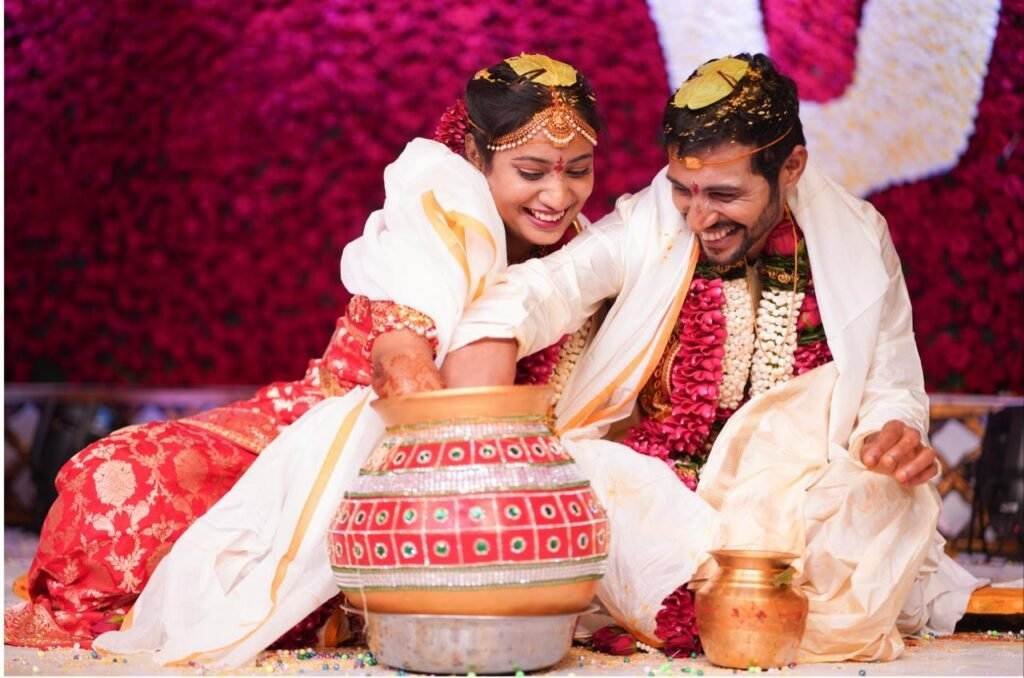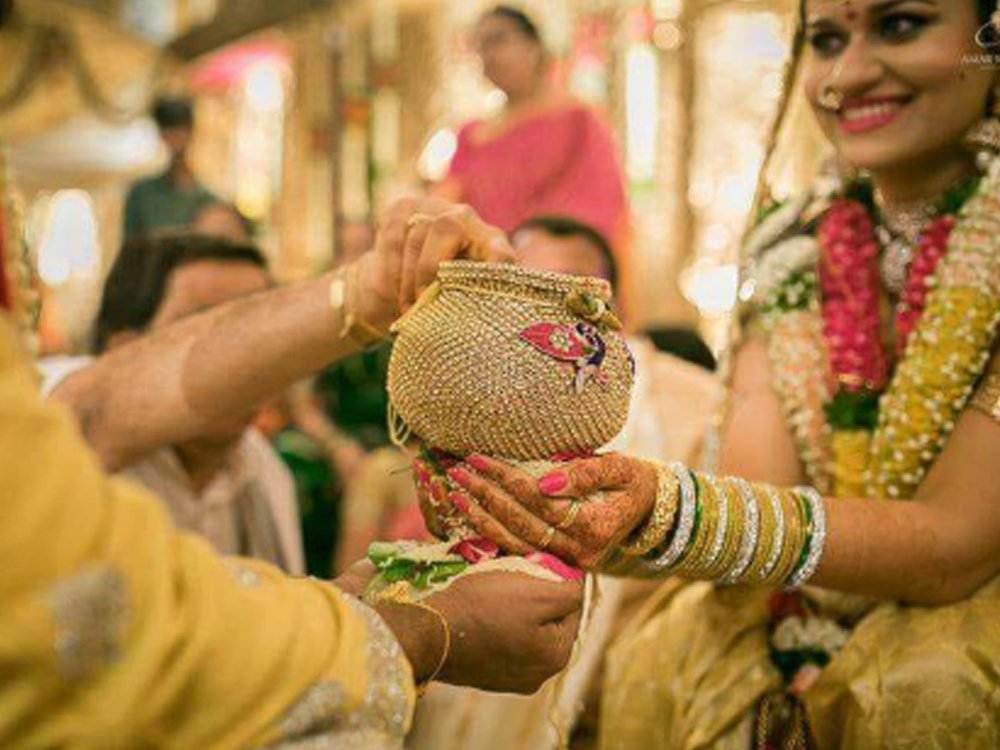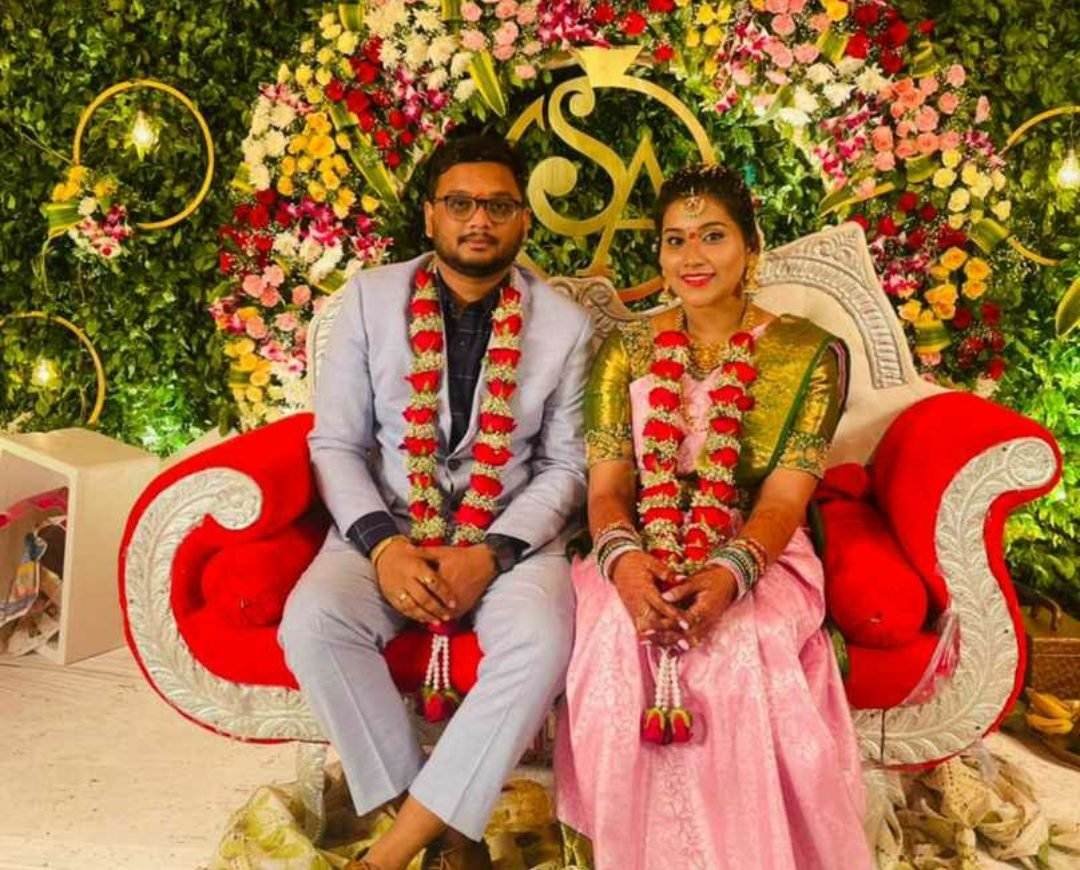In the vibrant tapestry of Indian weddings, each region paints its unique picture of customs and traditions. Among these, South Indian weddings stand out for their rich cultural heritage and elaborate ceremonies.
One such tradition, the reception in South Indian weddings, often perplexes outsiders. This practice of holding a reception before the actual marriage ceremony stems from cultural norms deeply ingrained in South Indian communities.
Significance of South Indian Wedding Customs

The rituals, meanings, and festivities that makeup South Indian wedding customs and traditions are a rich tapestry that enhances the occasion’s solemnity and beauty. Of these beloved traditions, the pre-wedding celebration is one of the most important. It provides a means for families to show one another love, strengthen their ties to one another, and ask for elder blessings. Beyond the reception, though, South Indian weddings are distinguished by an array of additional customs, like the engagement ceremony, or Nischayathartham, in which the families formally declare the couple’s intention to wed, and the auspicious time, or Muhurtham, during which the marriage vows are solemnized amid religious chants and customs.
These traditions represent the joining of two souls and the start of a lifetime journey together, together with the exchanging of garlands (Jaimala) and the tying of the sacred thread (Mangalsutra). Every ceremony has great significance and reflects the values and cultural heritage that the South Indian community holds dear. When combined, these traditions weave together the past, present, and future of the couple’s marital journey, creating a tapestry of tradition, love, and unity.
What makes South Indian Weddings different from other regional weddings

South Indian weddings stand out distinctly from other regional weddings in India due to their unique customs, traditions, and rituals. One of the most notable differences is the emphasis on simplicity and elegance in South Indian bridal attire, with brides typically adorned in exquisite silk sarees, intricate gold jewelry, and fresh flowers adorning their hair.
Additionally, the rituals and ceremonies in South Indian weddings often reflect a deep-rooted connection to religious and cultural traditions, such as the sacred tying of the thali (mangal sutra) during the marriage ceremony, symbolizing the union of the bride and groom. Moreover, South Indian weddings are renowned for their sumptuous feasts, featuring a delectable array of traditional dishes like dosas, idlis, sambar, and a variety of savory and sweet treats that tantalize the taste buds and reflect the region’s culinary diversity.
Why Reception in South Indian weddings held before marriage

1. Facilitates a warm welcome
Holding the reception before the marriage ceremony allows families to extend a heartfelt welcome to guests, fostering an atmosphere of hospitality, inclusion, and warmth. It makes sure that guests are welcomed and feel appreciated right away, fostering a sense of community and camaraderie among everyone in attendance. In addition, this early reception gives attendees plenty of time to get settled in, mingle, and enjoy the festive mood, laying the groundwork for an unforgettable event that exudes true coziness and hospitality.
2. Effective arrangements
Before-the-wedding receptions simplify the logistics, giving plenty of time to plan lodging, transportation, and other details with great care. Families may carry out plans with ease thanks to this well-planned scheduling, which reduces stress and guarantees a well-planned celebration that goes off without a hitch. Families can concentrate on making the celebration memorable and pleasurable for all guests by taking care of logistical issues like guest accommodations and transportation in advance. This way, every part of the celebration is painstakingly planned and expertly carried out.
3. Creates excitement and anticipation
The reception serves as a preamble to the main event, which excites attendees and creates a sense of excitement and expectation that permeates the mood. The celebratory atmosphere and the prospect of jubilant celebrations ahead invigorate the attendees as they look forward to the upcoming marriage ceremony. In addition, the reception gives families an opportunity to show off their hospitality and share their joy with family and friends, which fosters a sense of excitement and anticipation that permeates the entire celebration—from the first reception to the last moments of the marriage ceremony.
4. Opportunity for seeking blessings
The reception offers an ideal opportunity for the couple to receive blessings and well wishes from all who gather to celebrate their union. Amidst the jubilant festivities, heartfelt blessings are bestowed upon the soon-to-be-wedded couple, symbolizing the love, support, and goodwill of their cherished community. Moreover, the reception provides a sacred moment for the couple to seek blessings from elders and loved ones, receiving guidance, wisdom, and heartfelt wishes for a prosperous and happy married life.
Tips to plan a budget-friendly reception in South Indian weddings
- Opt for traditional venues: Consider hosting the reception at traditional South Indian venues such as community halls or temples, which often offer cost-effective rental rates compared to luxury hotels or banquet halls. These venues can provide a cultural backdrop that enhances the authenticity of the celebration while keeping costs manageable.
- Simplify decor: Embrace minimalist décor concepts that highlight traditional elements such as mango leaves, flowers, and traditional motifs. DIY flower décor options can also help reduce expenses, allowing you to create a personalized and budget-friendly ambiance without compromising on style or elegance.
- Plan a simple menu: Explore budget-friendly menu options that feature traditional South Indian dishes such as dosas, idlis, and vadas, which are not only delicious but also cost-effective to prepare in large quantities. Consider offering a limited but well-curated menu to reduce food costs without sacrificing quality or variety.
- Prioritize guest list: Carefully curate the guest list to include close family and friends, focusing on quality over quantity. Limiting the number of guests can help minimize expenses related to catering, seating, and venue space, allowing you to allocate your budget more efficiently.
- DIY entertainment: Instead of hiring expensive entertainment options, consider DIY entertainment ideas such as cultural performances by family members or a playlist of traditional South Indian music. These personal touches can add a unique and memorable touch to the reception while keeping costs within budget.
Conclusion
In conclusion, pre-wedding receptions at South Indian weddings serve as a meaningful precursor to the marriage ceremony. They embody the values of hospitality, tradition, and celebration, creating a memorable experience for all involved. By hosting receptions before the marriage ceremony, families ensure their guests feel welcomed, cherished, and included in the joyous celebration of love and unity.
FAQ
1. Is hosting a reception before the marriage ceremony a common practice in South Indian weddings?
Yes, hosting receptions before the marriage ceremony is a prevalent tradition in South Indian weddings. It reflects the cultural values of hospitality, inclusivity, and familial bonding while also serving practical purposes such as efficient logistics management.
2. How does hosting a pre-wedding reception symbolize prosperity and abundance?
Hosting a lavish reception before the marriage ceremony is often perceived as a symbol of prosperity and abundance within South Indian culture. Families may showcase their social standing and success through opulent arrangements, lavish decorations, and generous hospitality, reflecting their affluence and generosity.
3. How do pre-wedding receptions in South Indian weddings differ from receptions in other cultural traditions?
Pre-wedding receptions in South Indian weddings are characterized by their emphasis on hospitality, inclusivity, and the celebration of cultural identity. Unlike some Western traditions where the reception follows the marriage ceremony, hosting receptions before the ceremony is a unique practice that reflects the community’s values and customs.





